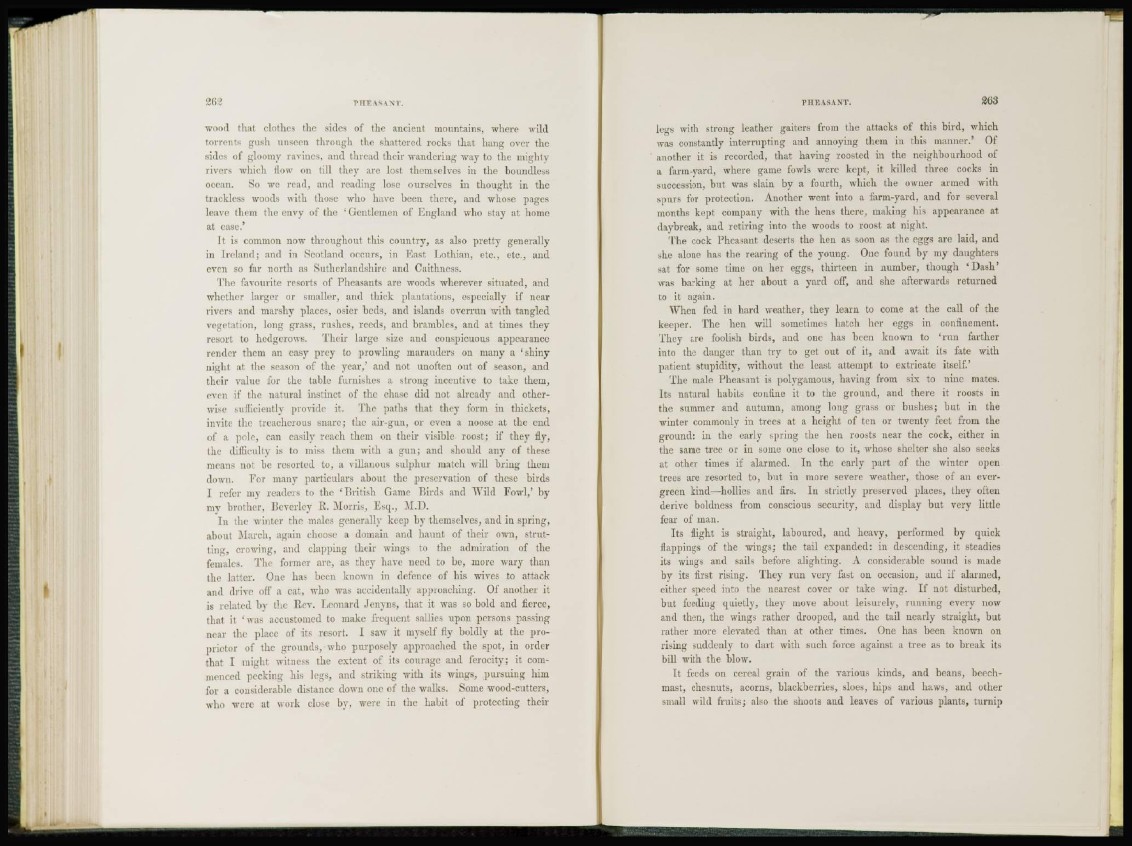
wood that clothes the sides of the ancient mountains, where wild
torrents gusli unseen through the shattered rocks that hang over the
sides of gloomy ravines, and thread their wandering way to the mighty
rivers which now on till they are lost themselves in the boundless
ocean. So we read, and reading lose ourselves in thought in the
trackless woods with those who have been there, and whose pages
leave them the envy of the 'Gentlemen of England who stay at home
at ease.'
I t is common now throughout this country, as also pretty generally
in I reland; and in Scotland occurs, in East Lothian, etc., etc., and
even so far north as Suthcrlandshirc and Caithness.
The favourite resorts of Pheasants are woods wherever situated, and
whether larger or smaller, and thick plantations, especially if near
rivers and marshy places, osier beds, and islands overrun with tangled
vegetation, long grass, rushes, reeds, and brambles, and at times they
resort to hedgerows. Their large size and conspicuous appearance
render them an easy prey to prowling marauders on many a 'shiny
night at the season of the year,' and not uuoften out of season, and
their value for the table furnishes a strong incentive to take them,
even if the natural instinct of the chase did not already and otherwise
sufficiently provide it. The paths that they form in thickets,
invite the treacherous snare; the air-gun, or even a noose at the end
of a pole, can easily reach them on their visible roost; if they fly,
the difficulty is to miss them with a gun; and should any of these
means not be resorted to, a villanous sulphur match will bring them
down. For many particulars about the preservation of these birds
I refer my readers to the 'British Game Birds and Wild Fowl,' by
my brother, Beverley K. Morris, Esq., M.D.
I n the winter the males generally keep by themselves, and in spring,
about March, again choose a domain and haunt of their own, strutting,
crowing, and clapping their wings to the admiration of the
females. The former are, as they have need to be, more wary than
the latter. One has been known in defence of his wives to attack
and drive off a cat, who was accidentally approaching. Of another it
is related by the Rev. Leonard Jenyns, that it was so bold and fierce,
that it 'was accustomed to make frequent sallies upon persons passing
near the place of its resort. I saw it myself fly boldly at the proprietor
of the grounds, who purposely approached the spot, in order
that I might witness the extent of its courage and ferocity; it commenced
pecking his legs, and striking with its wings, pursuing him
for a considerable distance down one of the walks. Some wood-cutters,
who were at work close by, were in the habit of protecting their
legs with strong leather gaiters from the attacks of this bird, which
was constantly interrupting and annoying them in this manner.' Of
another it is recorded, that having roosted in the neighbourhood of
a farm-yard, where game fowls were kept, it killed three cocks in
succession, but was slain by a fourth, which the owner armed with
spurs for protection. Another went into a farm-yard, and for several
months kept company with the hens there, making his appearance at
daybreak, and retiring into the woods to roost at night.
The cock Pheasant deserts the hen as soon as the eggs are laid, and
she alone has the rearing of the young. One found by my daughters
sat for some time on her eggs, thirteen in number, though ' D a s h'
was barking at her about a yard off, and she afterwards returned
to it again.
When fed in hard weather, they learn to come at the call of the
keeper. The hen will sometimes hatch her eggs in confinement.
They are foolish birds, aud one has been known to 'run farther
into the danger than try to get out of it, and await its fate with
patient stupidity, without the least attempt to extricate itself.'
The male Pheasant is polygamous, having from six to nine mates.
Its natural habits confine it to the ground, and there it roosts in
the summer aud autumn, among long grass or bushes; but in the
winter commonly in trees at a height of ten or twenty feet from the
ground: in the early spring the hen roosts near the cock, either in
the same tree or in some one close to it, whose shelter she also seeks
at other times if alarmed. In the early part of the winter open,
trees are resorted to, hut in more severe weather, those; of an evergreen
kind—hollies and firs. Iu strictly preserved places, they often
derive boldness from conscious security, and display but very little
fear of man.
I t s flight is straight, laboured, and heavy, performed by quick
flappings of the wings; the tail expanded: in descending, it steadies
its wings aud sails before alighting. A considerable sound is made
by its first rising. They run very fast on occasion, and if alarmed,
either speed into the nearest cover or take wing. If not disturbed,
but feeding quietly, they move about leisurely, running every now
and then, the wings rather drooped, and the tail nearly straight, but
rather more elevated than at other times. One has been known on
rising suddenly to dart with such force against a tree as to break its
bill with the blow.
It feeds on cereal grain of the various kinds, and beans, beechmast,
chesnuts, acorns, blackberries, sloes, hips and haws, and other
small wild fruits; also the shoots and leaves of various plants, turnip